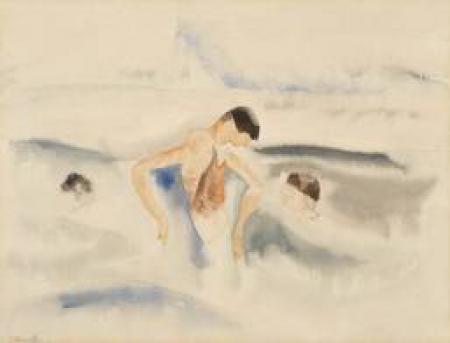Serendip is an independent site partnering with faculty at multiple colleges and universities around the world. Happy exploring!
Blogs

'how feminism became capitalism's handmaiden"
My daughter just sent me this article, written by Nancy Fraser and publishd in The Guardian (Oct. 13, 2013):
How feminism became capitalism's handmaiden--and how to reclaim it. I thought, given our recent discussion with Heidi Hartmann, and our more recent one "with" Wendy Brown about the end of the feminist revolution, it might capture your interest. Here's a taste: "We should break the spurious link between our critique of the family wage and flexible capitalism by militating for a form of life that de-centres waged work and valorises unwaged activities, including – but not only – carework.’"

Tricky Demuth
I glance at Demuth’s Three Figures in Water, and see three people swimming in the ocean. I begin to walk away, but as I take a step back, I realize that there are not three people in the painting, only three figures. Each figure has black bowl-cut hair. And, even though I cannot see one of the figure’s faces, I assume that he looks like the two other men in the painting. Like them, he has light skin and soft features. I see that all three figures are replicas of each other. They might not be three people; Demuth may have painted one man in different positions. First, he may have painted a man who is completely submerged in the ocean. Then, Demuth painted the same man again, but had him stand up in the water and rest his arms on the waves. And, Demuth may have painted this man one last time. On the right, the man swims in the ocean with his head above the surface.


The Postman
Samantha Plate
Play In The City
Mark Lord
11/24/2013
The Postman
I have never really had an emotional connection to a painting before. I found the notion of crying simply because of a painting ridiculous. How could a simple canvas inspire do much emotion? At the Barnes Foundation I learned exactly this.
As soon as I saw one of the famous Postman paintings, off in a corner, neglected by the crowded room, I was drawn to him. Having gone round in the wrong order, this was the last room that I had left to visit, and I still hadn’t decided what work of art I wanted to view for half an hour. As I made my way over his eyes drew me in. The brilliant light blue contrasted with the rich royal blue of his uniform and hat. They seemed to have a gleam in them, like he was on the verge of tears. As I stared into those eyes I found my own eyes watering too. This surprised me. What was making me so emotional? It could have been influenced by the emotional day I was having outside of the Barnes, the Postman did not look like my granddad, but I found my mind wandering to him and the funeral that was taking place on the other side of the world. Even so it was very strange to me that I had to suppress the urge to cry in the middle of Room 2 of the Barnes Foundation.

Dehumanizing death
I agree with the arguement Judith Butler makes in her essay "Violence, Mourning, Politics" that we have become desensitized to death. I, however, do not agree that it is a dehumanitization and/or desensitization that is only targeted towards the deaths resulting from violence against "the Arab people." More than 30,000 people in the United States are shot and killed by civillian gun violence every year. The names of these people are not repeated across the country, and in large cities these deaths could be at most a five-second piece in the evening news; that is all. We, as a people, are desensitized to death in general. Society, especially the influence of the media (the commonality of death in TV shows, the lack of respect for murder on the news, etc.) tell us that death is not a big deal, that instead it is a common occurance. I know we will all die one day, and that death is a way of life. But that does not mean we should have a lack of respect for the dead, especially those dead at another's hand. Instead of having death a part of everyday life, we should be trying to prevent pre-mature death, not sweep it under the rug and ignore it because it will not go away.

Man Vs. Corpse: Deep Play!
 One of the students in Mark's class had the idea that the talk Zadie Smith delivered @ Bryn Mawr was an example of "deep play in writing" that we all experienced/received. I loved this example, and wanted to share with you a copy of the talk, just published in The New Yorker: http://www.nybooks.com/articles/archives/2013/dec/05/zadie-smith-man-vs-corpse/
One of the students in Mark's class had the idea that the talk Zadie Smith delivered @ Bryn Mawr was an example of "deep play in writing" that we all experienced/received. I loved this example, and wanted to share with you a copy of the talk, just published in The New Yorker: http://www.nybooks.com/articles/archives/2013/dec/05/zadie-smith-man-vs-corpse/

Daddy Day Care (Feminism Unbound)
After the class on Thursday I’ve been trying to understand "feminism unbound" and applying it to my everyday life. From my understanding “feminism unbound” views feminism without it being attached to a goal. I tried to watch this movie through a "feminism unbound" lens and realized that it may be an example of "feminism unbound." Daddy Day Care is one of my favorite childhood movies. The little children making a mess and the friendly competition between the head of the private school and Eddy Murphy always amused me. The idea of child caring is usually the job of the mother.  She stays home, takes care of the children and makes sure the house is kept tidy. In this movie the roles are reversed and men are taking on the role of being nurturing and taking care of the children. They are criticized for this and called losers repeatedly throughout the movie. Their combatting the stereotype that men should only be the "bread winners." They’re also taking away that anxiety about men being harmful to children. The main character Eddie Murphy is now the caregiver while his wife, a lawyer, is working and paying for the bills. Usually in society today this couple would be criticized. The woman in this situation would be judged for allowing her husband to not go out and get a "real job." Or she'll be judged for not playing her role as the nurturing loving parent.
She stays home, takes care of the children and makes sure the house is kept tidy. In this movie the roles are reversed and men are taking on the role of being nurturing and taking care of the children. They are criticized for this and called losers repeatedly throughout the movie. Their combatting the stereotype that men should only be the "bread winners." They’re also taking away that anxiety about men being harmful to children. The main character Eddie Murphy is now the caregiver while his wife, a lawyer, is working and paying for the bills. Usually in society today this couple would be criticized. The woman in this situation would be judged for allowing her husband to not go out and get a "real job." Or she'll be judged for not playing her role as the nurturing loving parent.

may or may not be interesting... (hint, it's about orange is the new black)
I was just sent this link by a friend- http://www.reddit.com/r/IAmA/comments/1r2q6h/orange_is_the_new_black_author_piper_kerman_here/
Apparently Piper Kerman, the author of Orange is the New Black, announced on her twitter that she would be answering reader/viewer questions on reddit. Some of her answers/the conversation that was provoked seemed interesting so I thought I'd post the link here in case anyone wanted to read. IN particular, I wanted to post her answer to this question: "First of all, I have to say that I love that show, and love the book. But I have one big question. Do you think a women of color at Danbury would have had the opportunity to write a book & turn it into a successful TV show like you did?" (http://www.reddit.com/r/IAmA/comments/1r2q6h/orange_is_the_new_black_author_piper_kerman_here/cdj00ra)
Kerman responds: "I think inequality and white privilege are one of the big topics of the book. Racism is on stark display in the criminal justice system, whether you are talking about policing, prosecution, sentencing, or what happens to people during incarceration. Andrea James has written a book about her own experience in the same prison I was held in: www.amazon.com/Upper-Bunkies-Unite-Thoughts-Incarceration/dp/0988759306

Rights to my Silence
A right is an entitlement to obatin something, and I do not beleive one has rights over me; my thoughts, my opinions, my ideas, my silence, especailly my silence. To have a right to it is to have power over me. Only I know what is hidden in my silence, whether it be gold or trash, and only I should have the right to it, it is my property. In thinking about feminism, can keeping silence be a way in which one keeps power? I feel that at certain times it is necessary to speak to be heard so that others will recognize your existence and not step all over you. But i think one can be silent and still talk. Through movement, through dance, through words, through prayer, through action messages, ideas, concerns can be voiced. Silence speaks a different language.

re: Wendy Brown
The idea of tying feminism and revolution together definitely intrigues me, especially considering Brown's parallels to the fall of socialism in eastern Europe. One idea that stuck with me was in the final paragraph, where Brown, stating revolution as a 'paradigm of transformation', tries to imagine what movements would come about with the abolishment of revolution (which, paradoxically, seems a revolution in itself). While I cannot envision a revolution in the connotated sense, with fighting and barricades, I do wonder how else one might achieve certain end goals. Brown also states earlier that feminism, unlike some political and economic based revolutions, has little effect on the means of production in society, implying that such an act would hardly disrupt the status quo after the initial uproar. However, because of the cultural nature, I'm not sure anything but force powered by occasional legistlature would be able to establish a permanent change - the Czech Velvet Revolution was a successful example of a quiet transition, but it was also primarily political, and I struggle to imagine the same being true of feminism on a large scale. I would, however, love to see examples of non-revolutionary cultural shifts that would be able to support the idea of a similarly-structured new feminist wave.

Feminism Anew...maybe?
During our discussion, I mentioned a TED talk in which a woman discusses her feminism in relation to that of her mother's. This is one woman's definition of feminism. A new revolution, in my opinion, is happening--maybe one piece to fill the space left after Brown's feminism.


